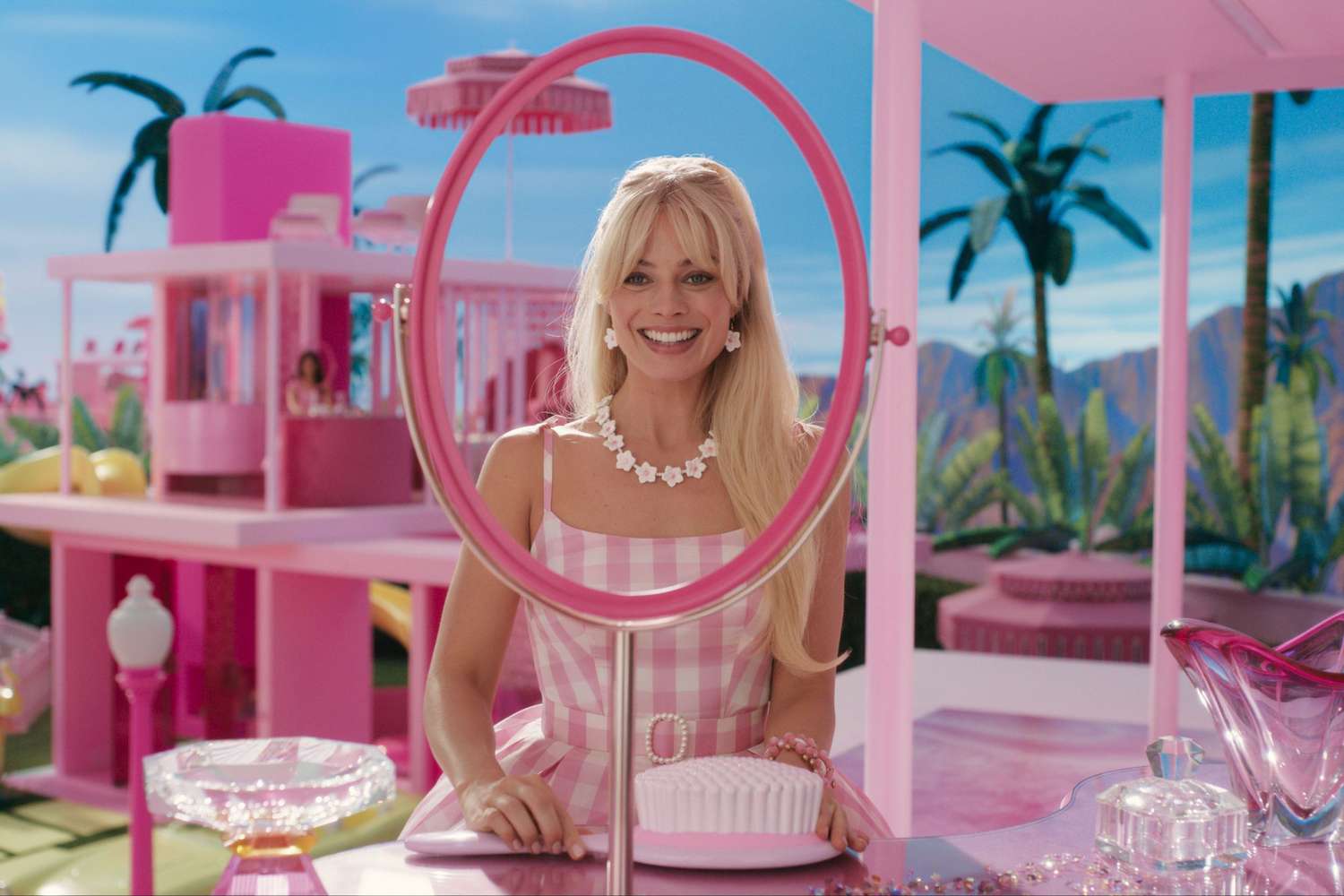
Barbie is a pastel-pink bout of cinematic blockbuster brilliance, co-written and directed by the always sublime Greta Gerwig. This is not Gerwig’s most personal film nor her best written, but it is her most philosophical. The concept of orchestrating a film for a toy so infamous does not come without its spout of ideas and runoff, and Gerwig capitalizes on all the complexities in a film that is lavish, fun, and brilliant. The film brings parallels to sleepover chick flicks like Aquamarine and Enchanted, where a mythical or magical woman struggles to adjust to the real world, with themes like that of the manufactured reality in The Truman Show, along with a dash of toys and the concept of play from The Lego Movie (including Will Ferrell in the real world, of course!)
Barbie follows Margot Robbie as ‘Stereotypical Barbie,’ who lives a perfect pink life in her dreamhouse in Barbieland. Barbieland is a heavenly matriarchy, where women hold all positions of power, and the men clamor for their attention. Barbie suddenly begins to have an existential crisis featuring thoughts of death, which causes her to venture to the Real World to connect with the woman playing with her and solve this rift between realities.
Barbie is an idea, a cultural phenomenon, and also just a girl. She is a mermaid, a fashionista, a princess, an astronaut, the president, anything the child playing with her wants her to be. Gerwig has a deep understanding of everything that a Barbie means and symbolizes, using Margot Robbie’s ‘Stereotypical Barbie’ as a means to explore these ideas through fantasy and reality. Gerwig understands what it means to play with a Barbie, and what it means to be a Barbie, and her expertise in this pink world makes Barbie a phenomenal film, and one of the greatest summer blockbusters of the decade.
Barbie is anything and everything, representing the limitless potential that adolescence promises. The film understands the humanity of this imaginative play, incorporating it into Robbie’s narrative in sweet ways without being overly saturated. Barbie effortlessly flies down from the top of her dream house to her car because when you play with Barbies, you don’t take the effort of monotonously walking her down the stairs. Playing with Barbies is not to establish a concrete plot and coherent narrative, but to explore an idea and a person. This is what Gerwig has always done. From Christine of Lady Bird in a tumultuous, overzealous millennium upbringing to the tangling romances and ambitions endured by Jo and Amy March in Little Women, Gerwig’s feminist tales always involve fascinating, complex characters exploring what feels like the beginning of their autonomy. Even the gem co-written by Gerwig and Baumbach, Frances Ha, follows a woman lingering between her present and future, her sense of self in how it relates to her friends and lovers. Like Lady Bird’s coming of age and acceptance of her love for her mom at the end of the film, as well as Jo March’s fierce independence and determination leading to the publication of her novel, Gerwig’s examination of female potential and power is iterated even through toys that represent women in Barbie.
Barbie marries Gerwig’s genuine earnestness, demonstrating both the historian and philosopher that she is, with the blockbuster craving for fun and music and laugh-out-loud comedy. Gerwig maintains her narrative brilliance and brings her intellect and deep cinematic knowledge to all the indulgence of blockbuster filmmaking. She references 2001: A Space Odyssey shot-for-shot in the opening of the film; she pays homage to classic musicals like Singin’ in the Rain and An American in Paris through dance sequences, and to the beautiful colors of The Umbrellas of Cherbourg. The playful production design, inspired by none other than real-life Barbie dreamhouses as well as films like The Ladies Man and Playtime, creates a perfect pink world that encapsulates the structural fantasy of play. The colorful costuming invokes the excited sensation that shopping for Barbie and her accessories does. Barbieland is magical, both in Gerwig’s perceptive, specific vision and the beautiful nostalgia it invokes in audiences.
Gerwig’s writing has always been genuine, though it has never been this abashedly funny (her co-writer Noah Baumbach does have some silly experience as co-writer of Madagascar 3!) The film is filled with laugh-out-loud moments that play perfectly both in crowded theaters and in more solitary viewings. The jokes never get tired (except that flat feet section) with Gosling’s Ken nailing every line delivery and the raucous chemistry between all the Barbies, Kens, and Michael Cera’s Allan, building the playful comedy any Barbieland would exhibit. Gosling’s delivery of the line “Sublime!” as well as the entirety of the “Push” by Matchbox Twenty performance had me crying laughing, even on my fourth watch.
Regardless of what individual critics thought of Barbie politically, the promise this shows – at least to me – towards meaningful blockbuster cinema cannot be disputed. It’s supremely entertaining, intricately detailed and meaningful, a film so emblematic of the year 2023, for better or for worse. Gerwig’s mastery is in the honesty and humanity of her characters from Frances Ha’s Frances Halladay (“I’m so embarrassed, I’m not a real person yet”) to Little Women’s Jo March (“I’m so lonely”). Robbie’s Barbie, as well as America Ferrera’s Gloria, put such a genuine beating heart at the center of the film, supplying this signature Gerwig honesty even in a film so big and fantastical. The blockbuster form is built on miraculously in Barbie, marrying Gerwig’s honest writing with homages to past blockbusters of all genres, with decorative splendor and the most 2023 soundtrack possible. Barbie, the film, and Barbie, the toy, are both cultural phenomena with immense meaning for women and girls everywhere, to be a part of the people who make meaning, to romanticize and fall in love with every part of what it means to be human.